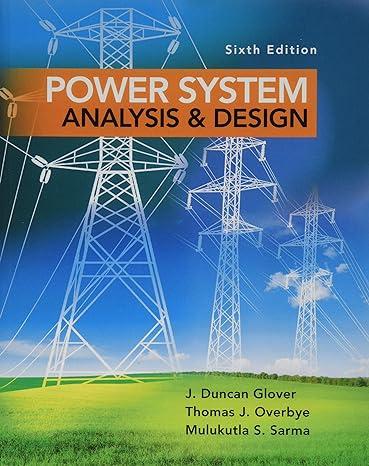The 500-kV, 60-Hz, three-phase line in Problems 4.20 and 4.41 has a (180-mathrm{km}) length and delivers (1600
Question:
The 500-kV, 60-Hz, three-phase line in Problems 4.20 and 4.41 has a \(180-\mathrm{km}\) length and delivers \(1600 \mathrm{MW}\) at \(475 \mathrm{kV}\) and at 0.95 power factor leading to the receiving end at full load. Using the nominal \(\pi\) circuit, calculate the
(a) \(A B C D\) parameters,
(b) sending-end voltage and current,
(c) sending-end power and power factor,
(d) full-load line losses and efficiency,
(e) percent voltage regulation. Assume a \(50^{\circ} \mathrm{C}\) conductor temperature to determine the resistance of this line.
Problem 4.20
Calculate the inductive reactance in \(\Omega / \mathrm{km}\) of a bundled \(500-\mathrm{kV}, 60-\mathrm{Hz}\), three-phase completely transposed overhead line having three ACSR \(1113 \mathrm{kcmil}\) conductors per bundle, with \(0.5 \mathrm{~m}\) between conductors in the bundle. The horizontal phase spacings between bundle centers are 10, 10, and \(20 \mathrm{~m}\).
Problem 4.41
Calculate the capacitance-to-neutral in \(\mathrm{F} / \mathrm{m}\) and the admittance-to-neutral in \(\mathrm{S} / \mathrm{km}\) for the line in Problem 4.20. Also calculate the total reactive power in Mvar/km supplied by the line capacitance when it is operated at \(500 \mathrm{kV}\). Neglect the effect of the earth plane.
Step by Step Answer:

Power System Analysis And Design
ISBN: 9781305632134
6th Edition
Authors: J. Duncan Glover, Thomas Overbye, Mulukutla S. Sarma





